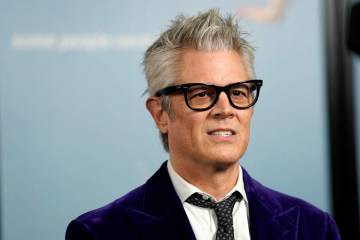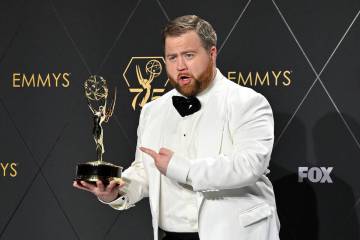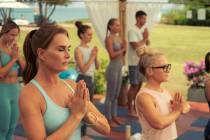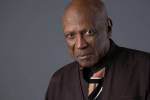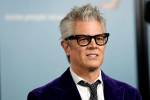Las Vegans in film industry weigh in on Oscars’ lack of diversity
Another Oscar season has arrived, bringing with it another chorus of boos about an Oscar acting nominees roster bereft of racial or cultural diversity.
Again this year, the Academy of Motion Picture Arts and Sciences' list of nominees for acting awards includes only white performers. So, again this year, critics and activists a have dusted off a Twitter hashtag that pretty much says it all — #OscarsSoWhite — and are wondering what may lie behind the awards' more-often-than-not cultural and racial blindness.
Las Vegas documentary filmmaker Stan Armstrong notes that a lack of minority representation in mainstream moviemaking is hardly a new trend. But, he says, "we have really come a long way from Hattie McDaniel being the first African-American woman to win an Academy Award (for best supporting actress) for the role of Mammy in 'Gone with the Wind' and Dorothy Dandridge nominated (for best actress) for 'Carmen Jones.' "
But, he adds, Oscar-nominated African-American actors — and minority nominees, in general — have been "few and far between" over the years.
A lack of diversity in Hollywood "is a problem," says Nate Bynum, a theater professor and head of the screen acting program at the University of Nevada, Las Vegas.
"In my experience, in the last 10 years the industry has tried to address it," adds Bynum, who also is a working Hollywood actor and screenwriter.
Cheryl Boone Isaacs, the current president of the Academy of Motion Picture Arts and Sciences, "is an African-American woman," he says, and the movie industry has instituted casting processes designed to find more minority actors and held workshops and programs for minority actors, directors, writers and producers "to train them and put them in the network."
But "that's a Band-Aid," Bynum says, because every year that there are no minority nominees, "the next year, you see the same thing."
"I don't think there's any thought-out sort of racism or a process to keep people out," Bynum says. Rather, Hollywood perceptions and misperceptions, as well as the aversion to risk that occurs wherever large sums of money come into play with anything, may serve as hurdles to greater minority representation in films.
First, producers and studios "want to make sure they get their money back, and make their investment back and make sure investors are happy as well," Bynum says.
That, in turn, can create such notions that only a handful of stars can open a picture or be acceptable to overseas audiences. Antonio Fargas, whose career includes work on stage and in film and TV (where he played the iconic role of Huggy Bear on the series "Starsky & Hutch"), says films and casting choices often are made based on "what is selling."There are "very few" stars who can green-light a film, Fargas says. As a result, major acting roles — the kind that can result in Oscar nominations — probably will go to a small group of stars, often non-minorities, who studios believe are bankable.
Following that line of perhaps questionable reasoning, minority actors "can add flavor to a film," Fargas says, "but they are not going to be the kind of roles that are going to be showy enough or have enough content to gain Academy consideration."
Producers also tend to green-light films with an eye toward what has done well before, Bynum says. That can lead to a sort of myopia when choosing, and then casting, projects.
"They say, 'This is what has always worked and this is what will work,' " Bynum says. And because Academy voters are largely older, male and white, they may not be aware of films, actors and performances that lie outside of what they already know.
Part of the solution to improving racial and cultural representation in the Oscars will come with "generational change," Bynum says, noting that "the generation growing up now sees it differently, and that's why these discussions are taking place with hashtags and tweeting."
And even if Bynum doesn't see deliberate racism or discrimination in this year's absence of minorities for acting Oscars, "I do have colleagues who do feel that way," he says. "And, certainly, there is the more radical side who say that's exactly what's taking place."
To be fair, minority actors have won top acting Oscars. In 2002, for example, Halle Berry won the best actress honors for "Monster's Ball" and Denzel Washington won the best actor award for "Training Day."
Bynum says the frustration that followed that year's Oscars stemmed from the fact that doors didn't remain open for minorities in the years since. More lasting change, he says, may come from minority actors, directors and writers taking greater control of their own destiny.
"I think for minority actors, it has to be more of a willingness to not be in front of the camera or, onstage, not on the stage, but actually behind the scenes as producers and writers, people who are in control of the images and who are the ones who are the storytellers. Those are the ones that pretty much control the industry."
And for aspiring minority filmmakers, "I think the skies are pretty much open," Armstrong says.
Moviemaking technology is more affordable than it was a decade or two ago — "Believe me, you can have an iPhone 6 today and make a film," Armstrong says — and films can be shown not just at film festivals but on sites such as YouTube or streaming services like Netflix.
"Breaking into the film business today is almost like breaking into the major leagues," Armstrong says. "You just have to play the game until one of your films makes it."
Bynum admits that seeing the lack of minority actors up for Oscars this year and last is "frustrating" in that the same scene tends to be seen so often.
"This discussion comes up every Oscar nomination (season) and maybe next year we'll have a Denzel/Halle Berry type of thing," he says. "Then, it dies down. You hope something is going to happen in the interim, and nothing happens. So the argument is cyclical. The discussion is cyclical."
— Read more from John Przybys at reviewjournal.com. Contact him at jprzybys@reviewjournal.com and follow @JJPrzybys on Twitter.





